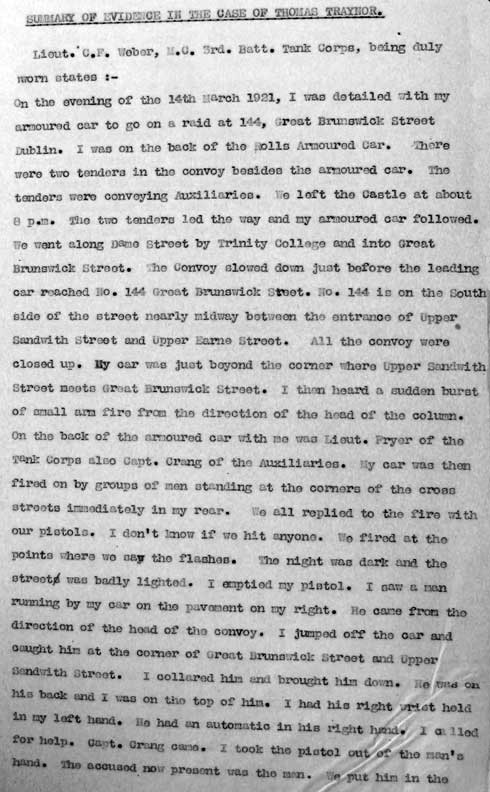

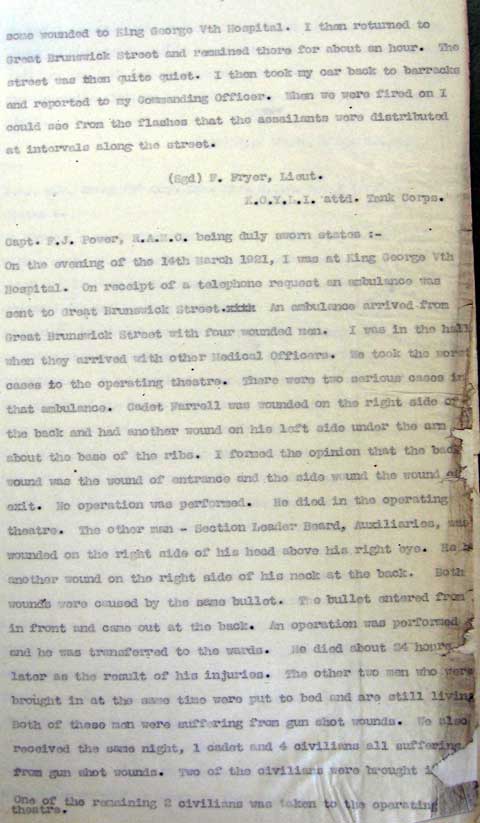
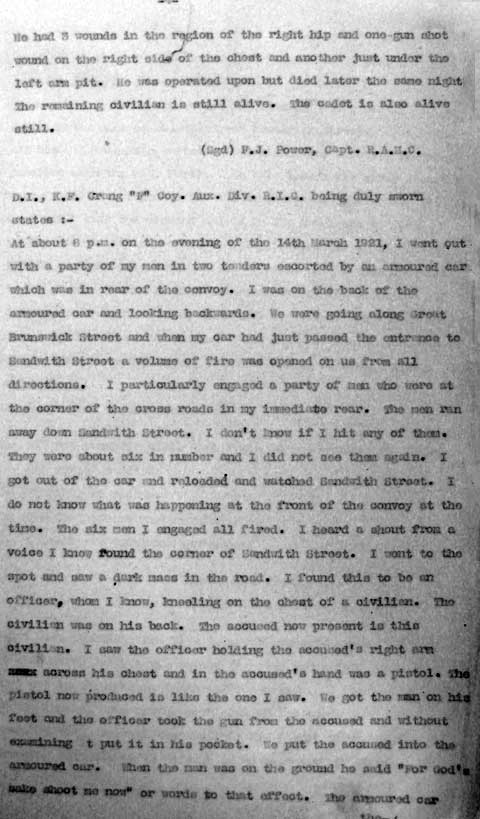
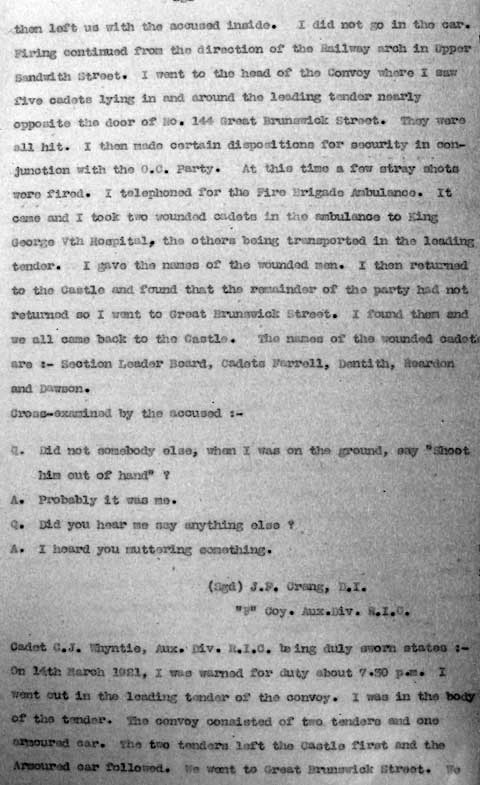
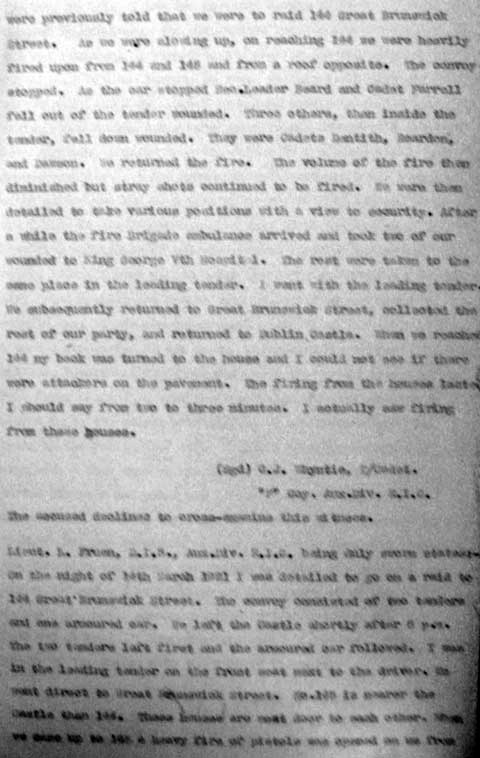
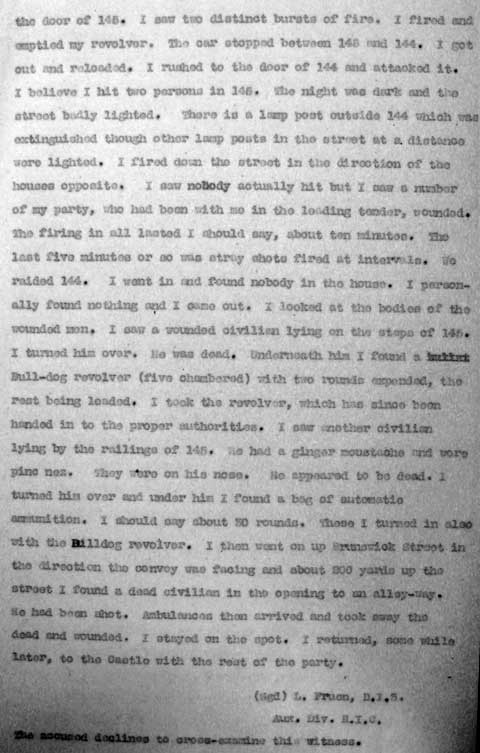
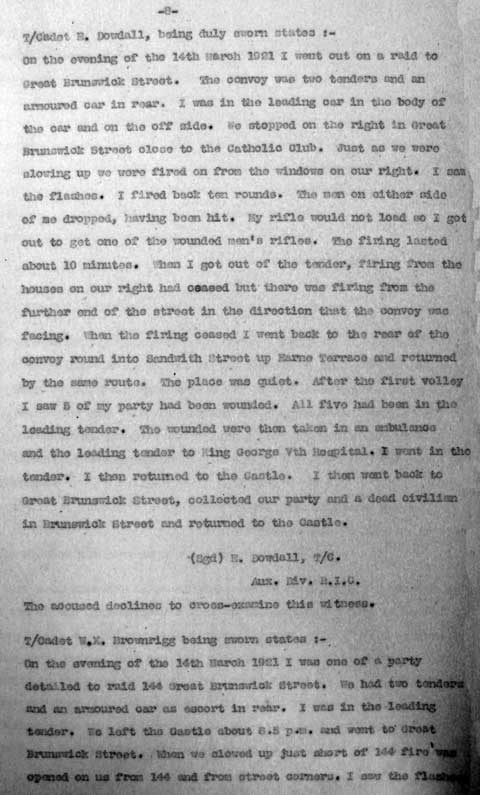
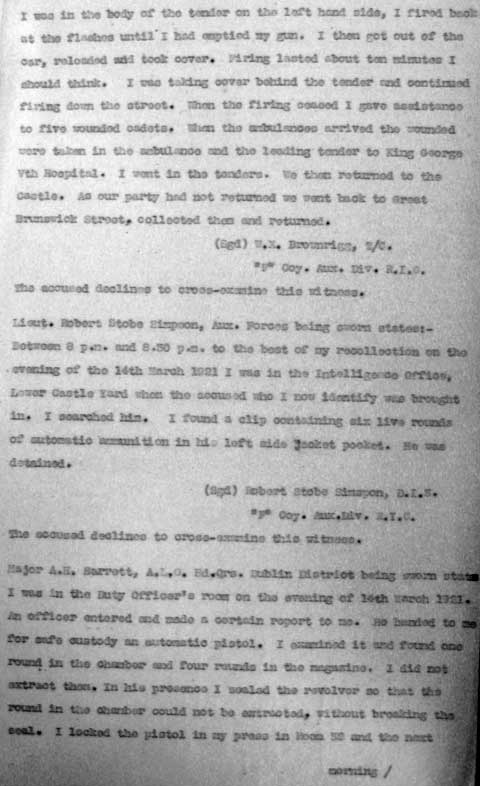
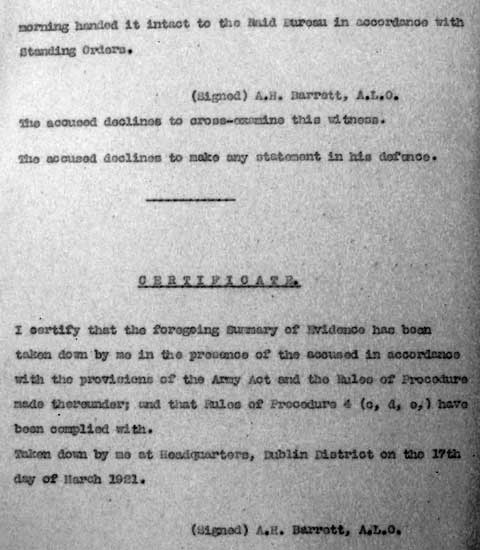










Witness Statement 707 by Michael Noyk, Solicitor to Collins and Griffiths who defended Traynor.
144 Great Brunswick Street was the headquarters of the 3rd Battalion. On that evening at about 8 o'clock a convoy left the Castle consisting of one. Rolls Boyce armoured car and two tenders which included a party of Auxiliaries for the purpose of carrying out a raid at 144 Great Brunswick Street. It was about 8 o'clock in the evening. The convoy slowed down just before the leading tender reached No. 144. Immediately fire opened on the convoy, the convoy stopped and a battle ensued, firing taking place from the direction of Upper Sandwith Street. A Cadet called Farrell fell wounded and sunsequently died, In addition there were some other military either killed or wounded. Apart from the military there were three or four civilians killed as well including Willie Fitzgerald of the 3rd Battalion who was a member of a well known family. Two men were captured, one of whom was Thomas Traynor. He was charged with the murder of Cadet Farrell on the 5th April, 1921, the trial being held at the City Hall before a General courtmartial convened by Major General G.F. Boyd, Commanding Dublin District.
Mr. Nolan Whelan, instructed by me, appeared for Traynor. The evidence against Traynor was that after the firing had been going on for some little time an officer, who had been in the armoured car, stated he saw a man running by the armoured cat on the south side of the street on the pavement, as he described it, on his right. This man came from the direction of the head of the convoy, that is to say from where the firing had started which resulted in the death of Cadet Farrell. This officer jumped off the armoured car and caught the man at the corner of Great Brunswick Street and Upper Sandwith Street - the eastern corner. He collared him and brought him down and he said that they fell to the ground, the officer being on the top of this man who was lying on his back on the pavement. This officer caught the right wrist of the man and held it in his left hand and his left hand was bent across his boy This man (Traynor) had an automatic pistol in his hand with four live rounds in the magazine and one live round in the chamber. When he was searched very shortly afterwards in the left side jacket pocket of his coat a clip was found containing six live rounds of automatic pistol ammunition. The clip fitted the pistol which was. in Traynor's hand when he was collared. The magazine held that clip and the rounds fitted that weapon. Another officer swore that he hard a shout from a voice that he knew at the corner of Upper Sandwith Street. He there saw a dark mass in the road and found a fellow officer kneeling on the chest of the accused. The officer was holding the right wrist of the accused across his chest in his right hand and there was a live round in the chamber of the automatic pistol. This second officer said that some conversation too1 place, either the accused speaking first or the officer speaking first but the accused at any rate said, "For God's sake shoot me now", and either before that or after it this officer said, "Shoot him out of hand". The comment of the Prosecutor was, "In my submission not a very unnatural thing for that officer to have said under those circumstances No comment is necessary on the mentality of an officer who captures a prisoner and makes a remark like that. Traynor was then taken under arrest, put into the armoured car and taken to Headquarters, Dublin District, where he was searched. The officer who searched him stated the clip of the automatic was found by him in the left hand side jacket pocket of the accused. The pistol was then taken by the officer who collared Traynor and handed to an officer at Headquarters, Dublin District. That officer examined the pistol and found one round in the chamber and four in the magazine. According to the Crown witnesses there were five casualties out of some seven or eight Auxiliaries in the leading tender.
No. 144 was raided but nothing was found in it, but a dead civilian was found on the steps of No. 145. The civilian who was found dead on the steps of 145 was alleged to have a bull-dog revolver under him which had five chambers, two of which contained expended rounds and three live rounds. When one of the officers was giving evidence he was asked by the Prosecutor, "Did he say anything to you when handed over to you". Mr. Whelan objected on the ground that that evidence had been sprung upon us as it was not contained in the Summary of Evidence. Of course the Judge Advocate, as usual, overruled the objection in typical manner. The Counsel for the Prosecution then asked a witness in relation to a conversation which was alleged to have occurred when Traynor was in the car being brought down to Dublin Castle. The Prosecutor's next question was, "Did the accused speak first; I want to be perfectly fair about this". The answer was that Traynor spoke first. The next question the officer was asked was to state in his own words what Traynor said to him in the car on the way. Mr. Whelan again objected. The President said, "I cannot hear you". The grounds to the objection were that the accused made a statement at the time he was arrested and had not been cautioned.
The Judge Advocate then intervened and asked whether the statement was made entirely voluntarily and without any suggestion on the part of anyone in the armoured car. Of course the witness replied, "Voluntarily". The next question was did anyone speak to the accused about the subject matter that evening before he made his statement and the witness replied that no one had spoke to the accused. The next question was, "Will you tell us what that voluntary statement was?" The answer was, "I am only a soldier like yourself". The next question was, "Nothing more?" to which the answer was, "And I have it to do". The next question was, "You told us just now he said something about firing, what was that? The answer to this was "That is what I just said". Question - "Just tell us again. We have had an objection by my learned friend, and I want you to tell us what he said about firing?" The answer was1 - The said - 'I am only a soldier like yourself, and I have it to do". He was then asked did the accused admit having fired on that occasion and the answer was that he admitted having fired. The officer was asked did he make any reply to that and he said no, he made no reply. The Judge Advocate then covered the same ground; he asked the officer whether he heard the accused say anything except, "I am only a soldier like yourself and I have it to do", and the officer replied, "That is all". Question - "That is the only time be opened his mouth;", and the answer was "Yes". The next question was, "Then there is no question he admitted firing the shot"? Answer - "Yes". The Judge Advocate said, "That is what I thought". Mr. Whelan - "I must protest against this", The Judge Advocate said, "I do not know what more you want; I am clearing it up for you". The President replied, "The Judge Advocate is making it clear to the Court". The Counsel for the Prosecution - "If you remember the order in which the evidence is given, he told me quite accidentally he admitted having fired, and the question was objected to, and the witness said he said, 'I am a soldier like, yourself". Then the Judge Advocate replied, "I am confident of this. I formed the impression at the time that this witness drew the conclusion that he meant he fired because he used those words, a conclusion that the words, do not bear". Counsel. for the Prosecution - "Not necessarily, no".
Then a member' of the Court asked, "Were any of the attackers in uniform?" and the answer was, "No!. Mr. Nolan Whelan asked an Auxiliary witness - "Do you know what the object of the raid was - I mean the raid of the convoy?" and the answer was "Yes". Mr. Whelan - "Will you tell the Court please". Answer - "I had been notified there were a certain number of gunmen there". Another officer witness of the Auxiliaries stated that when in the Castle Traynor made a voluntary statement, namely that he admitted firing rounds that night. Mr. Whelan again objected and in this case the objection was upheld because this Auxiliary admitted that he put the question to Traynor. This concluded the evidence by the Crown. Mr. Nolan Whelan, at the outset of the trial, had asked for the production of the witnesses - General Macready and Colonel Edward Johnstone, the head of the D.M.P. - the object being to show that a state of war existed between the armed forces of the Republic and Great Britain. They were not produced. No witnesses were called on behalf of the accused but the Judge Advocate asked the accused had he anything to say in his defence. The accused then said, "I am a boot maker by trade and I carry on a small business of my own in the city assisted only by my two boys. I have a wile and 10 children. Under these circumstances it takes me all my time to earn enough to keep them. I have never been yet asked by the Republican Party to take any active part in the present activity, but as an old member I was in the Army In 1916. I would be considered a proper person to do a message. The pistol in question was left in at my place on the Monday with the words: 'Bring this to 144. Great Brunswick Street at about 8 o'c1ock and you will find someone there to take it from you'. I proceeded to 144 at about 10 minutes past 8. I had just crossed Brunswick Street on the right hand side, and as I advanced about 4 or 5 yards towards 144. a military car passed me and stopped just in front of me opposite 144. Just then firing broke out. I stood up against the railings and when the firing ceased I took the thing out of my pocket and ran back towards Sandwith Street. I was caught at the corner of Sandwith Street. When I was put in the armoured car the men in the armoured car covered me with revolvers. I said, 'You may put them down'. I said, 'You are soldiers'. They put them down. That is all that was said while I was in the armoured car. The last, witness that was examined here says that I admitted firing shots; that is not true. He asked me a lot of questions such as, 'Did not you kill our men;, did not you fire at our people', and to end these questions I said: 'If I did I will answer for it' He afterwards used that as a boast that I admitted firing. That is all I have to say".
Mr. Whelan asked for a short adjournment and even that was refused. Mr. Whelan then made a very fine speech under the circumstances as the dice was heavily loaded against him. He based the whole case on fact, adding - "There may be many matters that one Would like to have asked but unfortunately in this country, as distinct from England, it is not possible, it is against the law to swear the Accused and to put him into the box where he can be examined by his own Counsel and cross-examined by the Counsel for the Prosecution and have any other matters cleared up by the learned Judge Advocate or Members of the Court. That is, not possible in this country and if there are any gaps in this statement it is not possible for the Defence to fin them in, owing to the state' of the law. He says he was a member of the Movement: "I was in the Movement in 1916'. You are all aware of the fact, it is a matter of public knowledge, of what took place at the Easter of 1916. He also says: "I have never yet been asked by the Republican Party to take any active part in the present activity"; in other words really the interpretation of it is, that he was a Member of the Irish Republican Party, that is what the reference to 1916 is, and he was out in Easter Week of 1916 fighting. That is what I suggest is the meaning of his statement that he made, and that he is still a. member of that Republican Party, and apparently, as a member of the Irish Republican Army, would come out and fight if called upon, but has not yet been called upon to do so. The reason, I suggest, for his not being called upon to fight, is because, as he tells you, he is a boot maker; he has a small business in the city assisted by his two boys, and he has a wife and 10 children. It is a matter of public knowledge that the Irish Republican Army have a considerable number of men at their disposal operating in different parts of Ireland, and it is a matter of common knowledge, and I think it is a very fair assumption to come to, that the time has not yet come for them to call upon married men with a wife and 10 children. His explanation is that, having been out in 1916, he would be a trustworthy reliable person to carry a revolver and. deliver it to 144. Great Brunswick Street. You were told by one of the witnesses that there were some gunmen there. He was going out, if his statement is correct, to deliver this revolver to some of the gunmen in ignorance of anything that would happen or that would be likely to happen there. If his statement is correct he went down there, and just about the time that this convoy arrived he, unfortunately for himself, happened to be there. The firing started, but, as you were told, or rather, as the evidence. I submit, proves, all this attack was made by different groups from different portions of that area. You had one group at one corner of Sandwith Street with a retreat open to it; you had another group on the opposite corner of Sandwith Street with a retreat open to it, and you had a further group, as I call them, in the house, No. 144, with a retreat apparently open also, and in the house 145 with a retreat open to it; also you were told that there was firing from the far side of the Street, that would be the left hand side, with a retreat apparently open, but there is no evidence before you that there were any isolated people on that footpath firing - isolated individuals - that is between 144 and the beginning of Sandwith Street. There is no evidence of that, and if his statement is correct, he just happened to be on the footpath there and I think put his back to the railings when the firing took place. You were told that the mole in which the attackers were located - it was a very dark night - the mode in which they were located was by the flashes of the revolvers or the automatics, whichever they were using. if this man was firing and he was up against the railings the flashes of his automatic would have been seen by somebody in the tenders or the armoured car: they being quite close to the footpath, and he would have been shot dead or, at least, very badly wounded; but there was no evidence of any wounding, and they took him unwounded, which, I submit, would be an impossibility if he had been firing as. he would have been located by the flashes. His story is that he stayed there and: 'When the firing ceased a little I took the thing out of my pocket and ran back towards Sandwith Street', in other words, as soon as there was a little lull in the firing, which you were told by two or three witnesses took place two or three minutes after the outburst - some said they could not locate the time, but his statement is that he ran away as soon as there was a little lull in the firing. This is consistent with the evidence, and so far all the evidence given bears out in toto the statement of the accused. The officer in the armoured car who tackled the accused told you that he did not see him firing at them, and also that he was running down towards Sandwith Street. If he wanted to escape and join up with the other group, from the evidence you must conclude that he only had to get past this officer and get away, and the easiest means of so doing would have been to fire if he intended to fire, but the officer tells you, in fact, he did not fire, and from what evidence there is I submit the only conclusion open to the Court is that the safety catch was on the automatic in fact when he was taken, If that is correct, it is quite clear he did not fire at all. If he did not fire he cannot have been a participator in this, and the fact that there are five cartridges left in the breech would prove that he was not firing. Another thing in his favour is I asked the first witness who tackled him, and he distinctly told me that he was alone when he saw him - he came from the front of the armoured car, and he was alone, and all the witnesses who came up on cross- examination said they did not see any solitary individuals on that footpath near the armoured car or the tenders. I submit to you that although the accused was there, as a fact in the darkness he was not seen owing to his not firing. With regard to the statement made by the accused when he was on the ground, a witness had told you that he was not quite sure of the exact words, but that he said, 'Shoot me now' or something to that effect. He was not sure of the exact words, but 'Shoot me, and put an end to it now', and that witness admitted he may have said something like Do me in now'. I submit the accused being on his back on the ground, with a knee on his chest, and a grip on his hand, and another officer there with a revolver, that he was frightened, and when he said 'Do me in now; do me in now', I suggest he thought that it would be better to be done then than at any other time, but it is in no way contrary to his evidence at all. He has prejudiced himself undoubtedly, particularly with a military court. You will have no sympathy I am sure with the members of the Irish Republican Army, and he has undoubtedly prejudiced himself by telling you, as I read his! statement, that he is and was a member of the Irish Republican Party, but that only goes to show the truth of the statement. If I am correct in interpreting his remarks that he is a member of the Irish Republican Army, it is not open to him to produce any evidence, because anybody who came here to produce it would be tried possibly upon a similar charge, or upon some other charge of a serious nature. For instance, the people who were in that house or in that attack, none of them could be produced to tell you that the accused was not a participator, none of them, and I do suggest that the person who handed him the revolver could not possibly be produced, and the result is that it is impossible in the circumstances to produce evidence for the defence on this line of defence that I am making for the accused. If you believe the statement of the accused, being a military tribunal unconsciously it may affect you, but if you believe his statement be will be acquitted, and let at large, and you may think he will be out in arms against one of yourselves in the near future; that unconsciously may affect you, but we know as a matter of common knowledge that if you do release him, he would be arrested immediately and interned, so that be is not at the moment a danger to any of the armed forces of the Crown. Now the other branch, if you do not come to the conclusion that the. accused's statement is correct, or alternatively you think the case for the prosecution has been made out,, the alternative defence I was putting up was that it was a conflict between forces of the British Army and the forces of the Irish Republican Army, but I have been debarred from making this point as I have not the evidence to prove to you that there is a state of war. If you will assume that there is a state of war, or if it is granted that there was a state of war in existence, 1 would be in a position to argue that he, as a prisoner of war, could not be tried for murder, because in war it is not murder to shoot, and the charge would fail. I am debarred from stating now what the Commander-in-Chief of the Forces of the Crown swore in other cases, it could not be evidence; I am debarred from stating it. Likewise I am debarred from stating the evidence given by Lieutenant- Colonel Edgeworth Johnstone in a case in this room to you a month ago, and. the defence I was putting up amounted to this that there was a state of war in this country, that the General Officer Commanding the Forces would. give evidence of a state of war, and the words he would use would be "a state of war" and not "a state of rebellion". I submit on the evidence you must come to the conclusion that this took place in a conflict between the armed forces of the Irish Republic and the armed forces of the Crown, and that you will also realise as a matter of common knowledge that a state of war exists in the greater part of Ireland. If my contention is correct, if you think the case for the prosecution has been proved with regard to his aiding, abetting and participating, the accused then is a prisoner of war, and as such a charge of murder does not lie against him. My learned friend, in replying, will possibly quote to you the law telling you that rebels are not to be entitled to the rules of war, and possibly quote you authorities, but you must recollect that it is a matter of common knowledge that the British Constitution is only partly written, and partly unwritten. The laws are likewise only partly statutory and partly common law, and as time has developed so have the unwritten laws developed, and I suggest to you that in the present condition of civilisation the shooting of rebels is contrary to them and it is not open to you to bring in a verdict of murder against the accused". I should like to make a comment myself. It is quite clear, in my opinion, what poor Traynor meant When he said, "Do me in now". In other words, he did not wish to share the fate of McKee, Clancy and dune, who were tortured and butchered in the Castle the previous November.
The Court then retired for their verdict and after the summing up the Judge Advocate hypocritically asked the Court to return their verdict.. He said, "The Court will of course remove from their minds all idea that the accused ever said anything else as to the admission of firing shots, or other words. The evidence that was given here was clearly, so far as the statement made by the accused at the Castle to that last witness is concerned, not admissable in evidence, and you will, therefore, reject it from your minds". He then said further - "What is the meaning of the suggestion, "For God's sake shoot me now', if he was a man who was there on a mere innocent mission; secondly, what was he doing with a clip of ammunition in his pocket, when he. was subsequently searched at the Castle after he had been brought there? The Court was then closed at 8 minutes past 6 o'clock to consider its findings and returned at 6.15 (seven minutes). At 6.20 the Court was closed for consideration of sentence which was that he was found guilty and sentenced to death. Poor Traynor was subsequently hanged.
The next person to be tried in connection with the same ambush was John Donnelly who was tried on Saturday, 11th June for the killing and murder of Cadet Francis Joseph Farrell. Most of the evidence in this trial is similar to that of Traynor. The trial was held in the City Hall and he was defended by Mr. Dudley White, K.C., and Mr. Charles Power, B.L. Unfortunately, during the trial Mr. Charles Power got ill and had to be taken away in the ambulance. Two officers were called to testify against Donnelly and they stated they found the accused wounded right on the scene of the attack. He was lying on his stomach somewhere about the top step of the door of No. 147 or 148 Lower Brunswick Street. He was lying on his stomach with his head towards the door and his feet pointing in the direction of the roadway. One of the witnesses who found him had an electric torch and he flashed it into Donnelly's face. Another witness swore to Donnelly being found there, and lying by his left hand was a loaded revolver - only a matter of inches away - a five chamber bull-dog revolver with three live rounds in it and two empty cases. This was the only evidence against Donnelly. Mr. Dudley White who had been prosecuting for the Crown for a great number of years made a very able defence which read as follows: - "If you please gentlemen I take it that before a tribunal of this sort and gentlemen of your experience and position I need not elaborate to any extent the responsibility which rests upon us all. For the last quarter of a century practically I myself have been either defending or prosecuting - mostly prosecuting - in this City and County of Dublin, and cases of this kind, it does not matter how old you are at the Bar, are harrowing to one. I quite appreciate my friend's position and that the case is also a harrowing one to him. It is equally harrowing to the Defence, and it must be to you, gentlemen, also. Life and death is at issue, and to any man sitting calmly and quietly, without any of the excitement attaching to a fight, listening to it whose fate hangs on the result it must be still more harrowing. There is one thing I have heard so often elaborated to the Court that it seems at tames to be almost a commonplace, but it is my experience from mixing with the learned men of my profession - and I put this to you so far as you act as lawyers and so far as. you have experience of Courtsmartial - that as regards this question as to the extent of uncertainty the Crown must show - the onus being on them to convince you of the prisoner's guilt - the old hackneyed words about giving the prisoner the value of the doubt are very often overlooked by juries and overlooked also by trained lawyers. I am sure you have often heard it said: 'If I had been on that Jury or on that courtmartial I honestly do not know what verdict I would have brought in. I am glad I was not on it because I really do not know what conclusion I ought to have come to'. It is a peculiarly unscientific question, because the moment the trained mind is applied to it and the moment the trained mind arrives at the point that it is merely a question of the balance of probabilities, the law itself says, 'If that is your state of mind you must acquit'. In other words, after a courtmartial or after a trial in the King's Court, no juror is asked to say - his oath prevents him from worrying his soul and saying 'After having heard all the Defence, I think on the whole the man is guilty and I ought to find him guilty,, but I have that horrible doubt that possibly his story is true' - because the onus is on the Crown to prove the guilt of the accused beyond any reasonable doubt and if the Crown has not fulfilled that onus the accused is entitled to an acquittal. Another matter dealing with documents found on premises which are in the possession of a man - a place he rents. They are deemed to be in his possession even if he shows that he has no responsibility whatever for them. In this case, however, it is quite different. In this case the pistol was; not found in any of the places where, if it were a document, it would raise the presumption against the accused. I suggest, therefore, that neither under your code nor under the criminal law of the land is there any presumption in law against the accused, because of the fact that the revolver was found near his body on the night in question, and on the other hand you have the general presumption of law in favour of his innocence as against his guilt. On this. part of the case I ask you, gentlemen, to bring vividly to your mind that it is not in this case a question of the degree of probability. The position is that the Crown must satisfy you that our Defence is not possibly true.
Dealing with this. youth - I think he is only 19 years of age or so - he tells you that he is employed in the Gas Works and that he lives quite close at hand so. that his being on the spot at the time in question was quite an ordinary place for' him to be either in connection with his home or in connection with his business. It was his natural venue, so to speak, and the very hour at which he was there was the natural time for him to be in the neighbourhood. Of course, we are not trying Traynor's case now and I am not going into that case beyond making it a basis in my mind for suggesting to you the tremendous difference between the evidence for the Crown in that case and the evidence for the Crown in this case. In this case you have the complete absence of the identification of either the physical or mental connection of the accused with the raid which occurred on this day. This boy has disowned any connection with the Republican Army or with any political organisation or party. You, gentlemen, I am sure have had experience of the various prisoners that have come before you, members of the rebel army who have refused to recognise the Court. There is nothing of that sort here. This man comes here to stand his trial and he recognises the Court and he has King's Counsel to defend him. He tells you that he did not, have a revolver in his possession that night, that he has never handled a revolver in his life, and he disowns any connection with any political party whatsoever. He says to you he was going along that night merely having a ramble in the ordinary way, that he heard shots fired, and that he immediately ran to the nearest shelter and threw himself down. He is in the neighbourhood where he naturally would be, his home being close by and the Gas Works where he works being in the neighbourhood. Shots are going all round,, he is in desperate peril and he runs for shelter, so that up to the question of the proximity of the revolver he is merely in a position in which any ordinary citizen or layman anxious for his life and seeking protection would be found lying. There are certain things in this case as to which there is no evidence at all, if there was in Traynor's case. In Traynor's case Traynor claimed to be a member of the republican party. It is the reverse here. Traynor said that he was out in 1916 and was regarded by the republicans as the proper person to undertake a message and the message he admitted receiving on this 14th March was to bring a pistol opposite No. 144 Great Brunswick Street and hand it over to some person apparently a member of the Republican Army. There is not a word or a suggestion of any such thing as that in this case. Also in that case the man Traynor was captured with extraordinary agility by one of the officers engaged in the affair who ran after him, tripped him up with a Rugby trip, held Traynor's hand with the revolver actually in his hand and the evidence was that at the moment of capture this wretched man, Traynor, cried out there and then 'For God's sake shoot me now'. Then I read that trying to put myself into the position of the defending counsel I was puzzled to think what Defence would have been put forward in that case and I see his Counsel was actually driven to the Defence that his client was a belligerent and that as it was a matter of warfare if he was the agent and abettor of the Republican Army it was not murder at all. I repeat this is an entirely different case. Before you can find the accused guilty the onus is on the Crown to show that groups of men were acting together for a felonious purpose and you must on legal evidence connect this man in custody with that revolver1 not merely physically but the Crown must show that he had gone there deliberately to aid in attacking and killing members! of the Crown Forces. I need not go into details, because it is a matter of absolute common knowledge that every day these shocking attacks are going on in our streets and not one of us ordinary innocent civilians is safe to walk through the streets of Dublin at present. Every one of us runs the risk when we are in the street of being killed or wounded by fire either directed against the Crown Forces or by fire from the Crown Forces defending themselves. Therefore, as convincing as I can, I put it to you that the mere fact of a man being found wounded in a public place near the place where he would ordinarily be and about the time he would be likely to be there is no evidence whatever that he is anything but an ordinary innocent civilian caught by the fire which broke out on all sides of him. He is; merely found lying down and wounded in the very kind of spot where any man in desperation would run to, for protection. Mere suspicion counts for nothing in the Crown's case, and you have the fact that any one of these assailants of whom there must have been many when running away might have thrown his revolver away and thrown it down at the very side of this wounded man. That I suggest to you is the explanation - and it is a probably explanation - of the revolver being found near his body. Then again the accused has not been connected with any positive act in any way whatsoever.
I could not find from the evidence whether any witness told the Court where Cadet Farrell was sitting in the tender". Counsel for the Prosecution: The last witness said that he was sitting with his back to 144. The doctor said the bullet entered at the right side of the back and came out at the left side. Mr. Dudley White continuing - "Of course, in this case, the exact bullet that killed either Cadet Farrell or Cadet Beard does not matter, because if the accused is proved to have acted in concert with others in this attack he would be equally guilty. At any rate, you have this evidence. The sixth witness only says there was firing from the doorway of 144 and 145 and from the upstairs windows of 144. In his statement at the Summary of Evidence he had said that the accused was found lying on the top step of either l47 or 148. You will remember I cross-examined him as to his evidence in Traynor's case where he speaks - and I think he finally came round to accept the view I put to him - that apart from the numbers of the houses there was one man found with a Bull-dog revolver, another man found lying on a bag of ammunition, and there was a third man found with a revolver. This is the passage that I read to him: Q. "Did you find another man on the steps of 145? A. - Yes. Q. Was he alive? A. I could not say. Q. Had he got any weapon 1/2ith him or near him? A. Yes, he had a revolver by the side of him. Q. Was that loaded or not? A. Yes, it was loaded. Two cartridges had been expended. It was one of the old-fashioned bull-dog revolvers". Therefore you have three men all in a position to have caused the wound from which the unfortunate Farrell died. There is firing from several other directions as well, especially from the direction of Erne Street. it is remarkable that that witness heard no shots from the rear. All the shots he heard came from the front. You will see, Sir, when you come to read through the preliminary statements before giving your judgment that the witness did not suggest that shots came from the direction of either 147 or 148. That statement to-day was in a certain sense drawn out of him. You will remember I objected to a leading question put by learned Counsel for the Prosecution on another matter where it was stated there were several wounded prisoners found lying in the street afterwards, and learned Counsel put the question: "They had got revolvers". There was another series of questions, "You saw snooting" - this is the way the question was put - "from the second or third house down". I objected to that and pointed out that the witness had not said that; that what he said was. that the second or third house down was where they stopped. That is not that he saw shooting coming from there. Then the learned Prosecutor said: 'I did not say he did say so', but just a moment before he had put the question: 'You saw shooting coining from the second or third house down". Then Counsel for the Prosecution put a question that I really felt I ought to take objection to: 'Had you seen any firing from the house on the doorstep of which you found this man?' He might as well have asked the witness: 'Did you see the accused man in such a position that firing must have come from a revolver in his hand". The proper legal question to put was: 'Where did you see the firing come from'. The answer was: 'That is where the firing was coming from'. Then he asked whether it was from the step of the house or out of the windows of the house and the witness's' answer was: 'From the steps. of the 'houses' and the doorways of the houses' showing that he was meaning that firing came from several places all along there. Then he was asked: 'Did you see any firing from the direction of the house where you found the man?' My point is that to that extent the evidence is put directly into that witness's mouth and the witness himself had not given that evidence in his earlier preliminary statement. Now, gentlemen, there is our Defence.
We were out on this night walking at this place in a perfectly innocent way, that we have no connection with any political body and none has been proved and it must be assumed that that is correct. We must, of course, work on the evidence that has been given here and the only evidence is that the accused man is found lying wounded with a revolver beside him in a suspicious position. Well, there is abundant evidence that there were numbers of people firing and any one of those could have caused the death of Cadet Farrell. I think Traynor was caught quite close to where this man was found and anyone running away having taken part in an attack of this kind on the Crown Forces the first thing he would do would be to throw his revolver away, If this is' to be a case of execution and the execution takes place, because this. man, although he was found in an absolutely innocent place, yet there was a revolver near him which he might have used, that I submit is not evidence on which any man can be convicted of this dreadful crime of murder. Every day in Dublin - you have the Custom Rouse and Croke Park - absolutely, innocent people being shot and the same thing happens, weapons are thrown about all over the place. If this man had been using this pistol there was nothing on. earth to prevent him from throwing it away. In addition you have the fact that there is no connection proved either direct or indirect between the accused and the Irish Republican Army. The only evidence is the evidence of the vicinity of the revolver to his body when he was found there lying wounded. You have no evidence of any overt acts being done by him. He was merely seen lying in a place where he would naturally be lying corresponding with his own story if he is rushing to seek protection. I take it that these men are searched when they are picked up wounded and if this man was a republican surely some ammunition would have been found on him. Traynor had a clip of ammunition. Almost every one of them has ammunition or a revolver or documents of some sort connected with them. Nothing was found on the person of the accused. Was his home searched and was anything found there? Has anything been brought before you to even create an atmosphere of suspicion against him? Did he make any incriminating statement? Did he say that he had been sent there?.... No, there is nothing of that kind in this case. I ask each of you gentlemen for the last time to ask yourself is it not absolutely possible that this man was merely lying down on that doorstep in self- protection and that an unforunate coincidence happened that one of the attackers in running away threw his pistol down and unfortunately threw it by the side of this man. You have the fact of other pistols having been found near the place. There was one absolutely on the spot at 145 and there is the man found with the bag of ammunition lying underneath him. That man may have been the person who dealt the fatal blow and I ask you can you convict a man of murder on the mere circumstance that he is found lying wounded beside a revolver?"
As might be expected the Judge Advocate's summing up was an additional charge by the Prosecution. At 4 p.m. the Court closed to consider its finding and at 4.l0 p.m. the Court re-opened. The Judge Advocate then cynically stated - "By direction of the Convening Authority the trial of the accused upon the Second Charge Sheet is not proceeded with". Donnelly was sentenced to be hanged and would have been hanged at the same time as MacEoin had not the Truce interevened